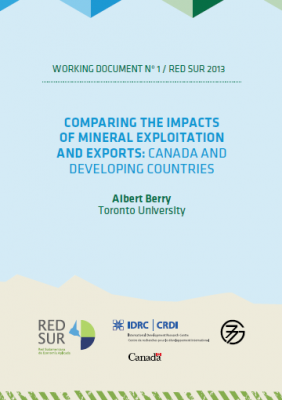2016Albert Berry

Canada has depended substantially on natural resources throughout its history and has had a reasonably important though never dominant mining sector since the second quarter of the twentieth century. One reading of the Canadian story has the modestsized mining industry playing a positive supportive role in overall development over more than a century. After climbing the manufacturing mountain with considerable success, and attaining the output structure of a modern rich economy, Canada reverted towards greater dependency on natural resources, especially mineral ones. The international record makes it clear that many countries have benefited greatly from mining and other natural resource exploitation and that many others have not—especially when employment and income distribution outcomes are taken into account. Analysis of what distinguishes these groups remains relevant to countries like Canada as well as to the resource-endowed developing countries. This document in particular aims to shed light on the impacts of mineral exploitation and exports for Canada with a focus on the lessons that could be useful for developing countries. It provides some background theory on measuring an industry’s contribution to the economy, highlighting the importance of considering all the factors involved to make a meaningful estimate. It also goes over aspects of the politics of mining in Canada and the debates of 2013.
This is one of the papers that contributed to the debate at Red Sur - IDRC’s workshop “The Future of Extractive Industries in Latin America and the Caribbean and the Role of Science, Technology and Innovation (STI)” held in Buenos Aires on September 21 & 22, 2016, which brought together regional and international experts and decision makers in different key areas related to the future opportunities and challenges for extractive industries development. The main aim of the workshop was to generate knowledge on how the Science, Technology and Innovation (STI) systems in LAC countries can help to face those opportunities and challenges in the light of the experience of resources rich developed countries and the current situation and prospects of extractive industries in the region.
